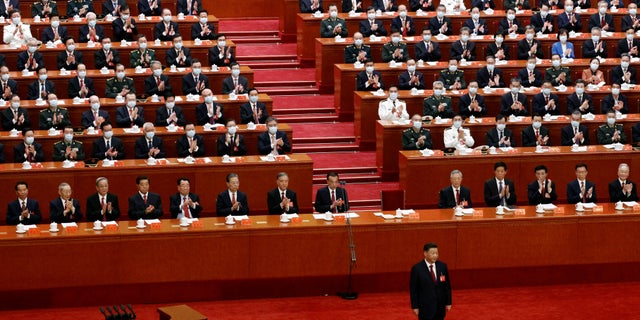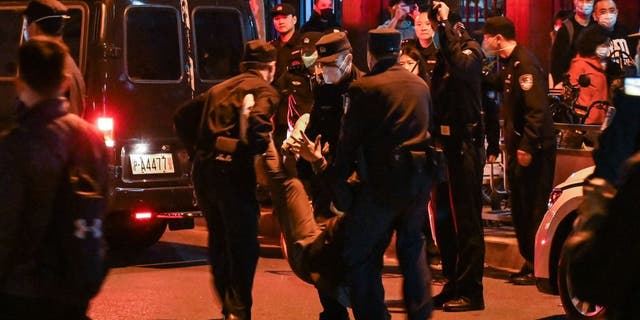Gordon Chang: How China is spying on the US
Gatestone Institute senior fellow Gordon Chang weighs in on Fufeng, a Chinese company tied to the CCP that aims to build a business in the United States near an American military base, on ‘The Ingraham Angle.’
From the struggle to put down nationwide protests against Chinese President Xi Jinping’s “zero-COVID” to Nancy Pelosi’s headline-grabbing trip to Taiwan, this year saw China dealing with the greatest challenges to its repressive regime.
Xi’s “zero-COVID” policy, which saw enforced lockdowns and quarantine along with mass testing in any town or city in which even a few positive cases of the coronavirus appeared, finally met its breaking point and forced the ruling party into an uncertain future after handing Xi an unprecedented third term as president.
With high inflation and significant slowdown due to its COVID-19 policies – prompting the party to even consider $700 stimulus checks – and tensions over a potential Taiwan invasion simmering but not yet at a boiling point, as well as a new spike in COVID-19 infections, the future for China is entering surprisingly unknown territory.
However, that is only possible due to the unprecedented year that China has experienced.
BIDEN STATE DEPARTMENT LAUNCHES ‘CHINA HOUSE’ INITIATIVE, SAYS BEIJING IS ‘MOST COMPLEX’ CHALLENGE
XI GROWS BOLDER
The National People’s Congress, the CCP’s highest legislative body, overwhelmingly voted to hand Xi, 69, his third mandate. State media outlet People’s Daily said the upcoming congress presented “great significance” for the whole party and the entire nation as it “embarks on a new journey toward building a modern socialist country in all respects.”
Chinese President Xi Jinping attends a meeting of heads of the Shanghai Cooperation Organization member states at a summit in Samarkand, Uzbekistan September 16, 2022.
(Foreign Ministry of Uzbekistan/Handout via Reuters)
“The congress will hold high the great banner of socialism with Chinese characteristics, uphold Marxism-Leninism, Mao Zedong Thought, Deng Xiaoping Theory, the Theory of Three Represents and the Scientific Outlook on Development, and thoroughly implement Xi Jinping Thought on Socialism with Chinese Characteristics for a New Era,” the announcement added.
Xi has held on to the party’s fidelity through the last five years of turmoil with a series of successes — growing international influence, massive leaps in natural resource infrastructure in Africa and an iron fist governance that has brought Hong Kong to heel.
CHINA PULLS 6 DIPLOMATS FROM UK AMID INVESTIGATION INTO ASSAULT ON PRO-DEMOCRACY PROTESTER
Xi has used his platform to further cement China’s place in the international security landscape, particularly through the Shanghai Cooperation Organization (SCO), which in September agreed to admit Iran.
Russia and China established the SCO along with former Soviet states in Central Asia as a replacement for the Shanghai Five and expanded the group four years ago to include India and Pakistan, giving China greater influence over the region.

Chinese President Xi Jinping attends the opening ceremony of the 20th National Congress of the Communist Party of China, at the Great Hall of the People in Beijing on Oct. 16, 2022.
(REUTERS/Thomas Peter)
Additionally, China did not shy away from its ties to Moscow as Russian President Vladimir Putin launched his invasion of Ukraine. Beijing purchased Russian coal before and after the invasion started, helping Putin limit the impact of economic sanctions from the West.
U.S. officials on both sides of the aisle consistently rank China as a top priority, with military officials continuing to call China the nation’s greatest pacing challenge.
The U.N. also accused China of serious human rights violations that may amount to “crimes against humanity” in a long-delayed report that looked at the treatment of at least one million Uyghurs and other Muslim ethnic groups in the country. Beijing swiftly denounced the assessment as a fabrication cooked up by Western nations.
The White House welcomed the U.N. report, with Press Secretary Karine Jean-Pierre noting that, “The report deepens our grave concern regarding the ongoing genocide and crimes against humanity that China is perpetrating. Our position on the atrocities in Xinjiang has been clearly demonstrated with our words and in our actions.”
CHALLENGES TO CENSORSHIP
Following a fire in a high-rise apartment building in Xinjiang, citizens demanded accountability and an end to the party’s “zero-COVID” policy. The fire killed 10 people, with many blaming the quarantine protocols for making it difficult for residents to escape the building. The anger spilled into the streets in the greatest and most direct pushback against the CCP’s rule.
Chinese citizens showed an increasingly sophisticated understanding of the party’s censorship, providing so much trouble for the infamous “Great Firewall” that the West had unprecedented viewing of the protests as videos popped up on social media platforms outside of China.
One such example included the now-famous “white paper protest,” in which people posted pictures of blank pages and hashtags of positive words so that they could bypass the algorithm and represent “everything people want to say but cannot say.”
CHINA RUSHES TO BOLSTER HEALTHCARE AMID COVID SPIKE OVERWHELMING HOSPITALS
Beijing appeared to relent, easing restrictions in a number of cities and dropping testing for asymptomatic cases, along with an end to some travel tracking. Health experts worry that China will simply face another rising wave of COVID-19 as they do not have a strong enough vaccination rate among the population.

A man is arrested while people gathering on a street in Shanghai on Nov. 27, 2022, when protests against China’s “zero-COVID” policy took place the night before following a deadly fire in Urumqi, the capital of the Xinjiang region.
(Hector RETAMAL / AFP) (Photo by HECTOR RETAMAL/AFP via Getty Images)
TikTok was accepted by many as a tool for spying on behalf of the CCP to the point that former President Trump banned the use of TikTok on government-issued devices.
President Biden revoked the ban and issued a broader review of social media platforms in his first year, but further lawsuits and challenges may see TikTok banned from the United States entirely, with unanimous support in the Senate for upholding a ban on all government devices just this month.
TAIWAN TENSION SIMMERED
No issue presents a greater threat to regional stability than China’s stance on Taiwan, which came under sharp focus following Putin’s invasion of Ukraine.
Some critics believed that Xi would use Russia’s success or failure in Ukraine as a test for how his own invasion of Taiwan might go, even as military experts argued that any such information would provide limited value due to the staggering difference in circumstances.
China has also potentially held off on an invasion due to Taiwan’s role in semiconductor production: The island nation accounts for 65% of global semiconductor supply and nearly 90% of microprocessors.
PELOSI PUSHES TO INCLUDE TIKTOK BAN IN $1.7 TRILLION SPENDING BILL
Taiwan remained in the headlines throughout the year, most notably when House Speaker Nancy Pelosi stepped foot in Taiwan against the warnings of Chinese officials, including one Chinese state media personality who suggested shooting down Pelosi’s plane before it reached Taiwan.
Taiwanese officials have remained defiant, noting the possibility that China could still invade Taiwan even after watching Putin’s invasion drag on for nine months with countless losses, but Taiwanese Counsel General Ambassador James J.K. Lee previously told Fox News that his people “will never surrender our freedom.”
CLICK HERE TO GET THE FOX NEWS APP
The U.S. stepped up its support for Taiwan, most recently fast-tracking weapons aid to Taiwan in addition to on-the-ground training for Taiwan’s military and other methods that will allow the deployment of the “Porcupine Strategy” – an asymmetric response that could allow smaller nations to withstand the greater might of an aggressive invader.
“The Chinese aggressive, coercive approach measure only strengthens our people’s will to safeguard our democracy and freedom,” Lee said.
Fox News Digital’s Timothy HJ Nezronni, Bradford Betz and Taylor Penley contributed to this report.